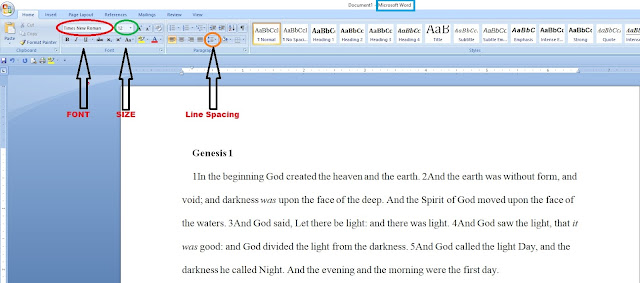Big Idea: A step-by-step guide how to create a Bible Passage Worksheet for Inductive Bible Study.
Inductive Bible Study is based on an in depth analysis of a Bible passage in its context of a section or chapter. One usually studies one chapter at a time sequentially. It may involve underlining, highlighting, circles, color coding and comparisons. It can be hard to do this in a Bible with thin paper and small size print. It is also difficult to do using a Bible app. Here is how you can make one on your own.
1. Go to an electronic version of the Bible.
Bible Gateway
2. Find the translation you are studying.
3. Highlight the passage and copy it. Usually you right click on the highlighted section and first choose select, then copy.
4. Paste it on a blank work processing document. Usually you right click and paste will be an option on the list.
5. Highlight the passage to make the following changes (Example displays MS Word)
a. Choose font. I use Times New Roman. Calibri is the default and is OK to use.
b. Choose font point size. I usually use 12pt. If you need large print use 14 or 16 pt.
c. Choose line spacing. Double spaced is best for room to work and mark up the passage.

6. Title with book and chapter.
7. Print.
______________________
This post is a supplement for the series of Practical Starter Guide for Inductive Bible Study.
Up next (New Series): One Story, One Spirit
Previous post: In Conclusion
______________________
Reflect:
1.Can you imagine the Bible as a workbook? Why or why not?
2. If you have ever studied a passage like this, do you recall a time when the exercise was meaningful?
.jpg)


.jpg)


.jpg)